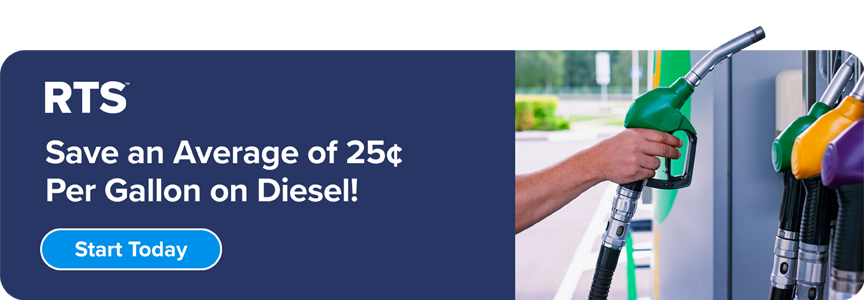
When managing expenses on the road, truck drivers have two main payment solutions: credit cards and fuel cards. But which is the better option? The answer isn’t straightforward. Gas cards and credits cards have their advantages, and many fleets use a combination of both.
In this guide, we’ll break down the key differences and help you determine the best fit for your needs.
What’s the Difference Between Gas Cards and Credit Cards?
Both fuel cards and credit cards can be used for trucking expenses, but they serve different purposes. Understanding the key distinctions will help you decide which aligns best with your business goals.
- Credit Cards: General-purpose spending tools that can be used for fuel, repairs, lodging, meals, equipment and other business expenses. They may offer cashback or rewards but typically come with higher fees and interest rates.
- Fuel Cards: Specifically designed for fuel and travel center purchases and sometimes maintenance costs. These cards often provide per-gallon discounts, expense tracking and customizable spending controls. In a way, fuel cards are like credit cards for truck drivers (with significant differences, of course, as we’ll explore below).
Factors to Consider in a Payment Solution
When choosing between a credit card or a fuel card, consider these critical factors:
- Discounts: How much can you save per gallon or per purchase?
- Location Acceptance: Where is the card accepted?
- Credit Score Requirements: Do you need a high credit score to qualify?
- Expense Tracking & Reporting: How detailed are the reporting features?
- Fees: Are there annual fees, transaction fees or interest charges?
- Security & Spending Controls: Can you limit purchases or set spending caps?
Now, let’s take a closer look at how gas cards and credit cards stack up against these factors.
Fuel Cards for Trucking: Maximizing Savings and Control
Fuel cards are designed to optimize fuel spending and fleet management. Here’s how they compare across key metrics:
- Discounts: Typically offer per-gallon discounts, negotiated fuel rates and bulk savings for fleet operators.
- Location Acceptance: May be limited to certain truck stops and fuel stations but often provide added perks at partner locations.
- Credit Score Requirements: Many fuel cards have lenient approval processes and may not require a personal credit check.
- Expense Tracking & Reporting: Offer detailed reports by fuel type, location and vehicle, helping fleets monitor fuel expenses efficiently. They also often have IFTA reporting features to simplify quarterly tax filing.
- Fees: Usually have lower fees and fewer interest charges than credit cards, but some may include transaction fees.
- Security & Spending Controls: Can be customized with purchase restrictions, driver PINs and real-time monitoring to prevent misuse.
How Credit Cards Compare for Truck Drivers
Credit cards provide more flexibility but may come with higher costs and fewer fuel-specific benefits. Here’s how they measure up against our metrics:
- Discounts: Cashback and rewards programs exist but usually don’t offer significant fuel savings.
- Location Acceptance: Accepted almost everywhere, making them more versatile for expenses beyond fuel.
- Credit Score Requirements: Typically require a good to excellent credit score and may require a personal guarantee for business accounts.
- Expense Tracking & Reporting: Standard transaction history is available, but manual tracking may be needed for detailed reporting.
- Fees: May include annual fees, high interest rates and late payment penalties.
- Security & Spending Controls: Offer fraud protection, but limiting purchases to specific categories is more difficult compared to fuel cards.
Fuel Cards vs. Credit Cards
| Fuel Cards | Credit Cards |
Discounts | Per-gallon on fuel & other trucking expenses | Cash back & rewards |
Locations | Limited to certain gas stations | Almost everywhere |
Credit Approval | Lenient requirements | Harsher requirements |
Tracking & Reporting | Detailed reporting, often including IFTA | Basic transaction history |
Fees | Depends on the card | Annual, interest & late fees |
Security | Fraud protection & purchase controls | Fraud protection |
Fuel Cards vs. Credit Cards: Which is Best for My Fleet?
Now that we've explored some key differences, the question remains: which is the right fit for you? The answer depends on your fleet’s priorities. Many carriers find that using both fuel cards and credit cards offers the best balance between savings and flexibility.
Credit Cards Are Best For…
- Fleets needing financial flexibility beyond fuel purchases.
- Carriers looking to cover lodging, repairs and other business expenses.
- Truckers who need a card accepted everywhere.
Fuel Cards Are Best For…
- Fleets focused on fuel savings and cost control.
- Carriers who want customizable spending controls for drivers.
- Businesses that require detailed tracking and reporting of fuel expenses.
Choosing the Right Payment Solution for Your Fleet
While it’s no secret that we’re a fan of fuel cards—especially our own--it’s often a mix of both fuel cards and credit cards that will allow you to maximize fuel savings while maintaining financial flexibility. If you’re ready to optimize your fleet’s expenses, explore RTS fuel cards and see how they can help you cut costs and improve efficiency.
Learn more about RTS fuel cards and how they can benefit your business. Contact us today to find the best payment solution for your fleet.
